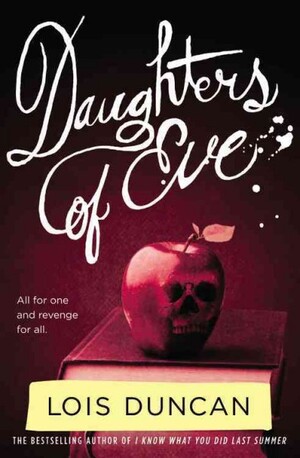 Title: Daughters of Eve
Title: Daughters of EveAuthor: Lois Duncan
Publisher: Laurel Leaf
Published: 1979
Number of Pages: 256
Genre(s): YA, Thriller, Suspense, Horror
Date Read: 2002 (The 1st time...)
Acquired: Coles (First copy) Amazon.ca (Replacement copy)
Summary:
It's 1979 but in the small rural Michigan town of Modesta the ideals and values still scream 1950s, especially when it comes to girls, women's rights and the feminist movement. The girls at Modesta High are being driven slowly insane trapped in the anti-feminist time warp that is trying to suck them under.
Ruth Grange has to deal with the fact that her three brothers get everything and get away with anything they want simply because they are boys, leaving Ruth to be their mother and housekeeper without a thought for her desires or dreams. Laura Snow is the overweight girl that nobody tries to notice, for anything other than making fun of her that is, all she wants it a friend. Jane Reardon is trapped in an abusive household with a mother who won't stand up for herself let alone Jane. These three girls' lives are changed radically when they get invited to join the Modesta Chapter of the Daughters of Eve, a sorority-esque club that is home to the elite females of Modesta High and sponsered by their worldly and strong feminist art teacher, Ms. Irene Stark.
It's more than a school club though-it's a secret society, a sisterhood, and they have a mission, to change the school, cast out the backward anti-female attitudes of not only the school but the town. At first, it seems like they are actually changing the way guys at school treat them. But then something happens and Ms. Stark begins to urge them to take more vindictive action, and it starts to feel more like revenge-brutal revenge. Some of the girls begin to question the group's actions, and Ms. Stark's motives and past, but they are ultimately blinded and bound by their oath of loyalty and so the Daughters of Eve become instruments of vengeance. Can one of them find the courage to break the spell before real tragedy strikes and there's no going back?
Review:
I enjoyed this book so much that when I went to reread it about 5 years after first acquiring it and I couldn't find my copy I went out and bought a new copy.
This is a pretty dark and gritty novel, but one shouldn't expect anything less from the author of I Know What You Did Last Summer. It's also a very powerful novel, showcasing the results of what one negative influence can do to a group of people, especially a group of young, malleable & impressionable people like the girls here. Irene Stark has a dark past and as you get further into the novel you can see just how unhinged she truly is to be capable of doing what she does to these girls. She could have benefited from counselling, it's this type of person that when you hear about them in real life you have to ask yourself how they even managed to become teachers and ask why we don't give psychological screenings to educators?
Another running theme in this novel is what happens when you give in to negative peer pressure, a club like this with binding oaths to secrecy, where the stronger members can force their will on the weaker characters and make them do things they wouldn't normally do if not for the pressure of being accepted and being part of an elite group, these are very real things that teenagers, girls especially, deal with on a daily basis. The girls in Daughters of Eve go down some very dark paths thanks to peer pressure. It's also interesting to pinpoint the moment where it goes from being simple peer pressure to mob rule. Very horrific to picture as you're reading it.
Duncan manages to explore those themes completely and thoroughly in under 300 pages, which I find incredibly impressive for such hugely loaded themes. Another aspect that impresses me is the way she manages to actually develop all of the many characters within the novel in such a short length. Other reviewers complained that she tried to take on too many characters and that many just ended up being stereotypes. I am inclined to respectfully disagree with that opinion, that is theirs and I have my own. I don't mind trope-y characters, tropes in characterisation fill a need. So yes you've got the brainy girl in Fran and the man-eating girl who of course is named Bambi as two examples, but both of these characters are much more fleshed out than that. Fran for instance ends up bonding with a boy, and emotionally and interpersonally she's actually one of the stronger voices amongst the girls and they all respect her and look up to her as a leader, where as the stereotype usually has the very brainy girl as being a wallflower, loner, plain or unattractive etc. Duncan makes certain that all of the Daughters of Eve are very real and very relatable, I remember the first time I read finding different aspects of myself within a few of the girls and that makes it very easy and enjoyable to connect to the book.
And now that I'm talking about it I want to re-read it again! Maybe I will!
--Ren


